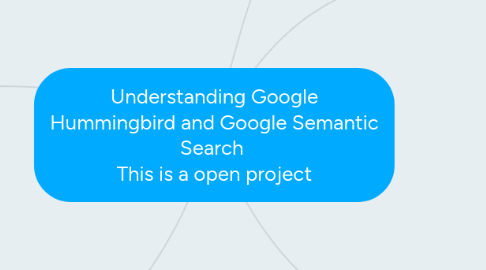
1. About this Mindmap
1.1. The goal is a collective learning creating a "knowledge graft" like structure with many people contributing. If you contribute something we want to get your name in the contributor area. I call this the Stone Soup Project! ;) - Martin Brossman (I am just a user of MindMeister and am compensated in no way for this by them. You can get 3 maps free if interested).
1.2. Contributors
1.2.1. If you are a contributor we want your name and G+ profile link.
1.2.2. Martin Brossman
1.2.3. Volker Schnaars
1.3. How to be a contributor? 1) Signup for the three free Mindmeister maps (see video) 2) Send me an email with the subject line: I would like to contribute to the Google Semantic Search Mindmap, including the email that you used to signup for Mindmeister ( Martin DOT ProNetworkingOnLine DOT com - Written out to reduce spam). 4) Also include the link to your website for me to add you as a contributor 5) Be respectful of the other contributors and only changing something if you are clear it adds greater clarity - Martin Brossman
1.3.1. My basic video on how to signup for the 3 free Mindmaps and basic use (click the arrow)
2. Reference - Recommended Books and other resources
2.1. Book: Google Semantic Search
2.2. Google+ Semantic Search Community
3. What is Google Hummingbird
3.1. Suggestions?
3.1.1. http://en.wikipedia.org/wiki/Google_Hummingbird
4. What is Google Semantic Search
4.1. Suggestions?
4.2. "four Big Data vectors" A way to understand the massive data that Google's Hummingbird has to manage is by breaking it down into 4 areas
4.2.1. Volume
4.2.1.1. "The sheer amount of information being pumped out "
4.2.1.2. How much data
4.2.1.3. Scale of Data
4.2.2. Velocity
4.2.2.1. "its ability to be repurposed "
4.2.2.2. How fast data is processed
4.2.2.3. Analysis of Streaming Data
4.2.2.4. "Data in Motion"
4.2.3. Variety
4.2.3.1. The various types of data
4.2.3.2. both structured and unstructured
4.2.4. Veracity
4.2.4.1. "Veracity is a measure of the truthfulness or provenance of the information"
4.2.4.2. both accuracy and context
4.2.4.3. How accurate is that data in predicting business value? Do the results of a big data analysis actually make sense? Data must be able to be verified based on both accuracy and context. (Dummies)
4.2.4.4. "provenance and trust"
4.2.5. Notes
4.2.5.1. Sources for Definition
4.2.5.1.1. http://www.dummies.com/how-to/content/defining-big-data-volume-velocity-and-variety.html
4.2.5.1.2. http://dashburst.com/infographic/big-data-volume-variety-velocity/
4.2.5.1.3. http://inside-bigdata.com/2013/09/12/beyond-volume-variety-velocity-issue-big-data-veracity/
4.2.5.1.4. http://vimeo.com/73288349
4.3. Components of Semantic Search
4.3.1. Entities
4.3.2. Ontologies
4.3.3. Nodes
4.3.4. Edges
4.3.5. Concepts: One aspect of semantic search means Google may start focusing more on concepts rather than specific keywords, in other words under the Hummingbird update Google will return results that don’t match all may be none of the given keywords within a query directly. The patent behind that can be find here: http://www.ipeirotis.com/wp-content/uploads/2014/01/wsdm2014-cqual1.pdf
5. Important components of Google to distinguish
5.1. Google Inc.
5.1.1. The company google
5.2. Google.com
5.2.1. a web search engine owned by Google Inc.
5.3. Google Now
5.3.1. "an intelligent personal assistant developed by Google that is available within the Google Search mobile application for the Android and iOS operating systems. "
5.4. Google Voice Search ( Voice Search )
5.4.1. Google Voice Search or Search by Voice is a Google product that allows users to use Google Search by speaking on a mobile phone or computer, i.e. have the device search for data upon entering information on what to search into the device by speaking.
5.5. Google Voice Search Hotword (Beta)
5.5.1. A Chrome extension that allows you to say ‘Ok Google’ and start speaking your search.
5.5.2. For Chrome
5.6. Google Chrome (Chrome)
5.6.1. Google Chrome is a freeware web browser
